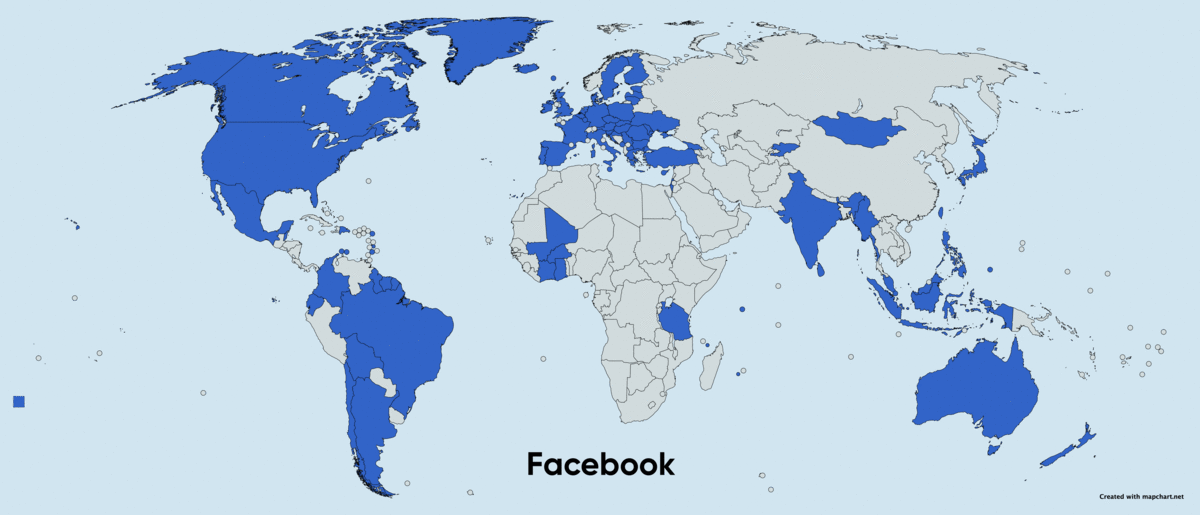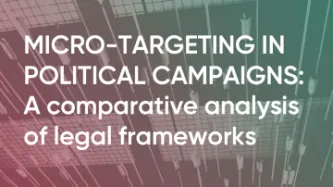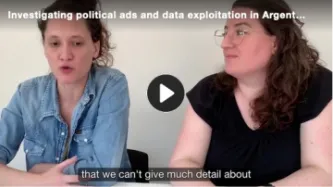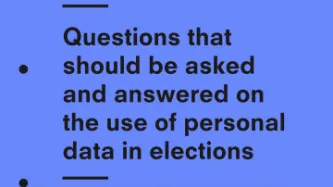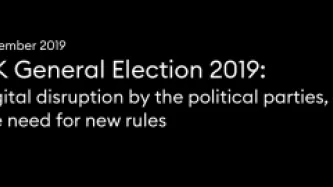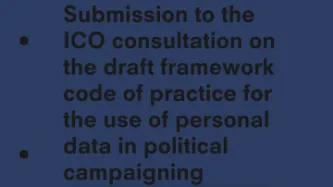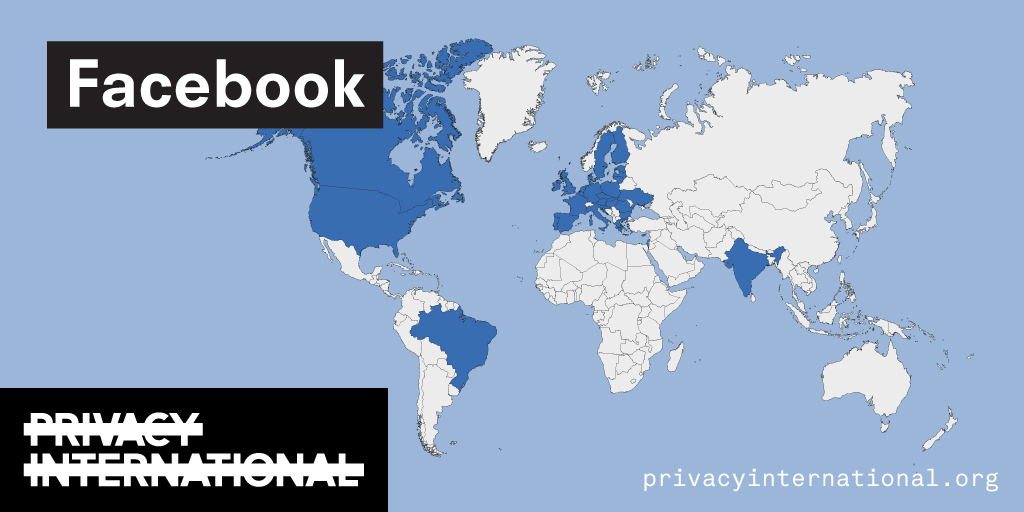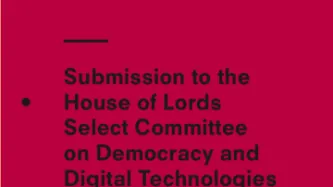Search
Content type: Video
In recent years, the use of online political campaigning has gained significant traction, with regulatory bodies often struggling to catch up. The unregulated use of political ads can pose threats to transparency, and all the more so when online platforms fail to play their part.
We at PI, together with InternetLab, are investigating the reach, effectiveness and impact of regulation by social media platforms and electoral authorities on online political advertising. Our research has…
Content type: Long Read
Among the many challenges of 2020, the impact on elections around the world kept us all on the edge of our seats. 75 countries postponed national and local elections due to Covid 19. Of the elections that went ahead, we saw Covid safe measures at polling stations (South Korea led the way forward in April) an increase in postal voting (who can forget the USA, but also Poland) and political parties in Uganda conducting "virtual" campaigns as mass rallies and in person campaign meetings were…
Content type: Long Read
Political parties depend on data to drive their campaigns, from deciding where to hold rallies, which campaign messages to focus on in which area, and how to target supporters, undecided voters and non-supporters, including with ads on social media. Political parties increasingly hire private companies to do the bulk of this work, and our primary concern is how these companies use personal data to “profile” people and drive election campaigning.
As part of PI’s programme of work on Defending…
Content type: Press release
Privacy International announces the launch of two reports as part of its work on Defending Democracy and Dissent.
The report Online Political Ads: A study of inequality in transparency standards builds on our 2019 research findings and delves into the adverse impacts of non-existent or limited transparency on democracy based on two case-studies developed by our partners InternetLab and ELSAM.
The report, Micro-Targeting in Political Campaigns,…
Content type: News & Analysis
Over the past years, there has been much attention paid to political advertising transparency on online platforms. Growing internet penetration and the rising popularity of social media have made social media platforms a key battlefield for political actors in the fight for votes, where political ads have proved themselves to be a popular weapon. This means online transparency towards voters has become more imperative than ever.
And yet, social media platforms’ regulation of political ads…
Content type: Report
This paper examines the various legal frameworks governing micro-targeting in political campaigns in six states: Canada, Brazil, France, Italy, Spain and the UK. It aims to assess national practices as well as point out gaps in their respective frameworks. The paper commences by examining how micro-targeting is defined and thereafter examines the legal provisions applicable to micro-targeting activities.
To do this in an accessible way, the paper follows and analyses the series of activities…
Content type: News & Analysis
PI is collaborating with The Carter Center election observation mission in the run up to and after Myanmar's national election on November 8th. The Carter Center is a US based NGO that has been invited to observe 111 elections in 39 countries since 1989. It has maintained a presence in Myanmar since 2013 when it's office was established in Yangon, and carried out long term observation for the 2015 election as well as 2020. The international election observer mission (IEOM) assesses the…
Content type: Examples
Less than a week before the election, the Democratic Party reported that Facebook's social media advertising systems had prevented the campaign from running some ads, allegedly resulting in the loss of more than $500,000 in potential campaign donations.
According to Facebook, the flaws resulted from a change in its political ads policy for the final week of the campaign. The policy change was intended to prevent political advertisers from uploading new ads in the week…
Content type: Frequently Asked Questions
On 27 October 2020, the UK Information Commissioner's Office (ICO) issued a report into three credit reference agencies (CRAs) - Experian, Equifax and TransUnion - which also operate as data brokers for direct marketing purposes.
After our initial reaction, below we answer some of the main questions regarding this report.
Content type: News & Analysis
Privacy International (PI) welcomes today's report from the UK Information Commissioner's Office (ICO) into three credit reference agencies (CRAs) which also operate as data brokers for direct marketing purposes. As a result, the ICO has ordered the credit reference agency Experian to make fundamental changes to how it handles people's personal data within its offline direct marketing services.
It is a long overdue enforcement action against Experian.…
Content type: Advocacy
Privacy International responded to a call for submissions by the UK Committee on Standards in Public Life ahead of their electoral regulation review.
This submission follows our recommendations on challenging data exploitation in the online political campaigning ecosystem, and suggests avenues for the Electoral Commission to adapt its regulatory powers to address the resulting privacy challenges, as well as public concerns about data-driven election campaigning.
Content type: Video
The incorporation of new technologies to electoral processes is a phenomenon with a global and exponential growth. Despite its benefits, online campaigning is not without challenges, and can pose threats to transparency and equity in electoral competition. Given the role of elections as foundational pillars of the democratic system and a key gateway for the exercise of fundamental civil rights, these implications must be assessed with care and through specific tools.
We at PI, together…
Content type: Advocacy
The entire election cycle is increasingly data dependent. This is particularly the case with political campaigns which are ever more digital and data driven. This campaign environment presents novel challenges due to the scale and range of data available together with the multiplicity, complexity and speed of profiling and targeting techniques. All of this is characterised by its opacity and lack of accountability. Existing legal frameworks designed to curtail this exploitation often also fall…
Content type: News & Analysis
Last week, Facebook announced that it would allow voters in the United States to opt out of seeing social issue, electoral or political ads from candidates in their Facebook and Instagram feeds.
Whilst Facebook’s attempt to increase the agency of users during the election period is commendable, the binary choice left to voters to either see political ads or not see them at all is a limited and short-sighted one.
Real transparency concerns are still unaddressed
Whilst Facebook…
Content type: Video
Immediately following the UK general election in December 2019, we worked with Open Rights Group to commission a YouGov poll about public understanding and public opinion about the use of data-driven campaigning in elections.
The poll used a representative sample of 1,664 adults across the UK population.
'Data-driven political campaigning' is about using specific data about you to target specific messages at you. So, for this might involve knowing that you are, for example, likely to…
Content type: Case Study
The run up to Kenya’s 2017 elections was extremely tense. Kenya has a history of violently fought elections and there was fear this election would be no different. It was in this tense environment, that companies like Cambridge Analytica and Harris Media – and their digital offerings - got involved in the election campaigns.
Cambridge Analytica’s business model is by now familiar, they compiled a huge amount of data points, often through illegal means, to create profiles on individuals –…
Content type: News & Analysis
Political campaigns around the world have turned into sophisticated data operations. They rely on data- your data- to facilitate a number of decisions: where to hold rallies, which States or constituencies to focus resources on, which campaign messages to focus on in which area, and how to target supporters, undecided voters, and non-supporters.
While data driven political campaigns are not new, the granularity of data available and the potential power to sway or suppress voters through that…
Content type: Long Read
This review is based on information in the public domain, primarily that of the platforms themselves. It is not exhaustive and this field moves with speed - however, it aims to offer a snapshot of approaches and practices.
TikTok
TikTok is a short-form video app (owned by ByteDance) which allows advertising and sponsored content. Two thirds of TikTok’s over 113 million users (are reportedly aged 16-24) and it was the second most downloaded app in 2019, beaten only by WhatsApp’s 849…
Content type: Long Read
Commercial interests seem to often overshadow the EU’s stance as a global privacy leader. After looking at Europes's shady funds to border forces in the Sahel area, Niger's new biometric voting system, and attempts to dismantle smugglers networks powered by Europe's gifts of surveillance, freelance journalist Giacomo Zandonini looks at the battle for data protection and digital rights in the continent.
What do a teenage labourer on a marijuana farm in Lesotho, a…
Content type: Advocacy
In order to ensure free and fair elections, it is essential that there be safeguards and protections applied to prevent the exploitation of personal data. It is important that those with responsibilities for protecting our data be transparent in order to ensure that there are effective safeguards in place, and civil society plays an important role in holding them accountable.
At Privacy International we developed the attached questions to help obtain information from bodies/authorities…
Content type: Explainer
Television offers some of the earliest instances of digital marketing. The majority of television channels rely on commercials and advertisements to maintain their operations. For the past 75 years, TV adverts have been passive transmissions broadcast to viewers, the demographics of the channels audience guiding the kinds of products and services shown during commercial breaks and intermissions. With the changes in the way individuals are now consuming content however, broadcasters are trying…
Content type: News & Analysis
On New Year's Day, the Twitter account @HindsightFiles began publishing internal communications and documents from the now defunct SCL Group, dating from 2014-2018. They came from the hard drive of Brittany Kaiser, who held several senior positions at SCL Group including at one of its subsidiaries, Cambridge Analytica, and featured in the Netflix documentary "The Great Hack".
Privacy International first investigated Cambridge Analytica in 2017. We questioned the company's role in the Kenyan…
Content type: News & Analysis
In the run up to the UK General Election on 12 December 2019, Privacy International, joined by other organisations called on political parties to come clean about their use of data. The lack of response to these demands combined with other evidence gathered by groups during the run up to the election demonstrates that current regulations are not fit for the digital era.
This briefing to which Privacy International contributed together with Demos, the Computational Propaganda Project at the…
Content type: Advocacy
As we come to the end of 2019, major weaknesses remain with the transparency that all major platforms have so far provided to users. This piece will overview these weaknesses and suggest steps to move forward in 2020.
Tying heightened transparency to "political" ads introduces a variety of problems. For a start, each platform has defined "political" differently, with some having wider definitions and some, incredibly narrow. When an ad is not designated as political, oftentimes it is provided…
Content type: Press release
Privacy International, Open Rights Group, the Institute for Strategic Dialogue, Fair Vote, Who Targets Me? and Demos have today written to all the main UK political parties, demanding that they are transparent with the public about how they are using voters’ personal data in their electioneering. Twitter's announcement yesterday of their ban on political advertising is just the latest wake up call to politicians about the risks to democracy of personal data driven microtargeting of political…
Content type: Advocacy
In October 2019, PI responded to the UK Information Commissioner’s (ICO) consultation on a draft Code of Practice for the use of personal data in political campaigning.
This follows on from PI's submission in December 2018, to the ICO’s Call for Views.
PI welcomes the draft Code of Practice as a first step. However, much remains to be done to close the implementation and enforcement gap and strengthen existing regulatory frameworks.
In response to the ICO’s questions, PI’s submission…
Content type: Long Read
An analysis of what Facebook, Google, and Twitter have done to provide users with political ad transparency as of September 2019. Our full analysis is linked below.
Recently the role of social media and search platforms in political campaigning and elections has come under scrutiny. Concerns range from the spread of disinformation, to profiling of users without their knowledge, to micro-targeting of users with tailored messages, to interference by foreign entities, and more. Significant…
Content type: Advocacy
PI is increasingly concerned that democratic participation can be inhibited by novel and unhindered surveillance both by governments and companies. To safeguard our rights, earlier this year, we launched our work programme, Defending Democracy and Dissent, which aims to investigate the role technology plays in facilitating and/or hindering everyone's participation in civic society.
This submission to the House of Lords covers PI’s views on:
How digital tech has changed the way…
Content type: Long Read
We found this image here.
Using Facebook, Google, and Twitter’s ad libraries, PI has tried to understand how political ads are targeted in the UK. This information – which should be very clear on political ads – is instead being squirreled away under multiple clicks and confusing headings.
Importantly, in most countries around the world, users cannot understand why they’re being targeted with political ads on these platforms at all. This is because Facebook, Google, and Twitter have taken…
Content type: Advocacy
On 28 August 2019 PI joined International Privacy Network partner Asociación por los Derechos Civiles and others in writing to the Directors of Public Policy for Latin America at Facebook, Google, and Twitter. The letters outline what steps are needed to make the social media giants' ad archives effective. Earlier this year organisations across Europe, led by the Mozilla, wrote to the companies with similar guidelines - the letters sent today say that equivalent steps should be taken for ad…



